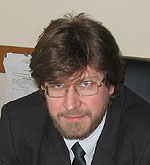© «Russia in Global
Affairs». № 2, April — June 2008
 The recent Russian presidential
The recent Russian presidential
campaign was void of intrigue, but that does not belittle the
significance of the election. Although Vladimir Putin is not
leaving politics and will remain in power as the prime minister, a
new stage is beginning in the country’s development. Dmitry Furman
points out in this issue that the very fact that the Russian leader
was replaced in accordance with the Constitution is an event of
historical significance and a step toward the construction of
democratic institutions.
The results of Vladimir Putin’s rule
are the leitmotif of this issue.
Discussions about whether a new Cold
War is possible between Russia and Western countries have become a
distinguishing feature of the last few years. Anatoly Adamishin, in
his very interesting article, writes about the sources of the
present situation in the world and the lack of understanding
between Russia and the West. This outstanding Russian diplomat, who
took part in major Soviet-U.S. negotiations in the late 1980s and
early 1990s, insists that in those years a chance was lost to make
the end of the Cold War into a joint project for the future. He
places a great deal of the blame for that on the West, which sought
to take avail of the changes in the Soviet Union to consolidate its
own positions.
There is a growing feeling that the
lessons of the Cold War, which have never been learned, are one of
the reasons for the unsatisfactory situation that we are seeing
today. Adamishin’s article provides a good beginning for
discussions about those lessons, which we would like to start in
our journal in the next few months.
Putin’s foreign policy cannot be viewed
in isolation from objective global tendencies, Timofei Bordachev
and the author of this introduction believe. Some of the
peculiarities of Russia’s conduct are due to internal subjective
factors, but on the whole Moscow’s foreign policy has blended well
into the global picture of universal rivalry.
Alexander Rybas analyzes what Russia
has achieved in the global arms market amid conditions of growing
competition, while Alexei Grivach and Andrei Denisov write about
the difficulties faced by the ‘energy superpower’ – a definition
that became a trademark of Russia during the Putin
presidency.
Two other stable idioms of the last few
years – ‘dictatorship of the law’ and ‘the power vertical’ – are
the focus of attention of Vladimir Ovchinsky and Ivan Sukhov. Emil
Payin analyzes at what stage the formation of a united nation is in
Russia and what this process is based on – national traditions or
the inertia of the past.
At the initial stage of his presidency,
Putin said that a European choice was his priority. The results of
the eight-year interaction between Moscow and Brussels are the
subject of articles by Vladimir Pankov, Kari Liuhto, Sabine Fischer
and Susan Stewart.
Putin’s years were marked by heated
debates about the direction Russia was moving in. Some analysts
insisted that the country had swerved away from the correct path
and had “gotten lost” in the difficulties of the transition period.
Others argued that the “time of troubles” and of false reference
points was over and that the Russian state had finally embarked on
the right track.
Alexander Lomanov in this connection
points to a phenomenon that has not been sufficiently analyzed by
political researchers – transition without a destination. Until
recently, the experience of Central and Eastern European countries
was taken as a model for the transformation of totalitarian
political regimes and planned economies. All of them adopted the
Western model of a state system and viewed integration into
European institutions as their main goal. Russia and another great
power – China, which is also going through comprehensive reforms –
have ruled out subjugated development and limited sovereignty for
themselves but, at the same time, have declared their desire for
democracy and a market economy. It remains an open question whether
Moscow and Beijing will succeed in achieving the same goal that
other countries have reached, by following their own, unorthodox
paths.
Arkady Moshes analyzes Ukraine’s unique
transition to democracy. Despite unfavorable prerequisites, Kyiv
has been consistently following the path laid out by Central and
Eastern European countries, which increasingly differs from the
trajectory of movement in the other post-Soviet states.
Martin Gilman writes about external
economic conditions for the present national transformations. He
warns that the world is returning to an era of growing inflation,
which will have an impact on general global development and on the
prospects for individual countries, including Russia.
Our next issue will focus on the
problems of xenophobia and on the search for national harmony in
Russia, on who can and must become the engine of the country’s
modernization, on the prospects for U.S. National Missile Defense,
and on other issues.









